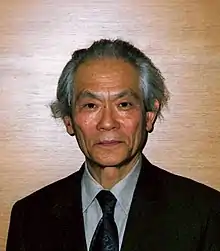Shizuteru Ueda | |
|---|---|
 | |
| Born | January 17, 1926 Tokyo, Japan |
| Died | June 28, 2019 (aged 93) |
| Nationality | |
| Alma mater | University of Marburg Kyoto University |
| Era | 20th-century philosophy |
| Region | Japanese philosophy |
| School | Kyoto School |
| Institutions | Kyoto University |
Main interests | Buddhism, Zen, philosophy of religion |
Shizuteru Ueda (上田 閑照, Ueda Shizuteru, January 17, 1926[1] − June 28, 2019) was a Japanese philosopher specialized in philosophy of religion, especially in philosophy of Buddhism and Zen. He was a professor at Kyoto University and considered a third generation member of Kyoto School (京都学派, Kyoto-gakuha).[2]
Biography
Shizuteru Ueda was born in Tokyo, Japan.
As the son of a Buddhist priest, he studied philosophy at Kyoto University where his mentor Keiji Nishitani oriented his studies toward medieval mystics.
He then went to Germany and received a Ph.D. degree from the University of Marburg with a thesis on the Western Christian mystic, Meister Eckhart. He returned to Kyoto University to teach philosophy of religion. In 1976, He was awarded a Doctor of Letters (文学博士, Bungaku-Hakushi).
He later focused on the thought of Kitaro Nishida. Being a Zen practitioner, Ueda—like Nishida—studied Zen Buddhism under the philosophical categories of Western philosophy. He is considered a third generation member of Kyoto School.[1]
Family
- His wife is Maniko Ueda (上田真而子, Maniko Ueda), who is a Japanese literary specialized in German literature.
Bibliography
- Die Gottesgeburt in der Seele und der Durchbruch zur Gottheit. Die mystische Anthropologie Meister Eckharts und ihre Konfrontation mit der Mystik des Zen-Buddhismus. Mohn, Güterloh 1965
- Zen y filosofia, Barcelona: Herder, 2004.
References
- J. C. Maraldo: Zen, Language and the Other. The Philosophy of Ueda Shizuteru. In: The Ten Directions. Edited by Zen Center of Los Angeles and The Kuroda Institut. 10:2 (1989)
References
- 1 2 Fritz Buri (1997). The Buddha-Christ as the Lord of the true self: the religious philosophy of the Kyoto school and Christianity. Mercer University Press. p. 251. ISBN 978-0-86554-536-6.
- ↑ "上田閑照氏が死去 京都大名誉教授" (in Japanese). nikkei. 11 July 2019. Retrieved 11 November 2020.